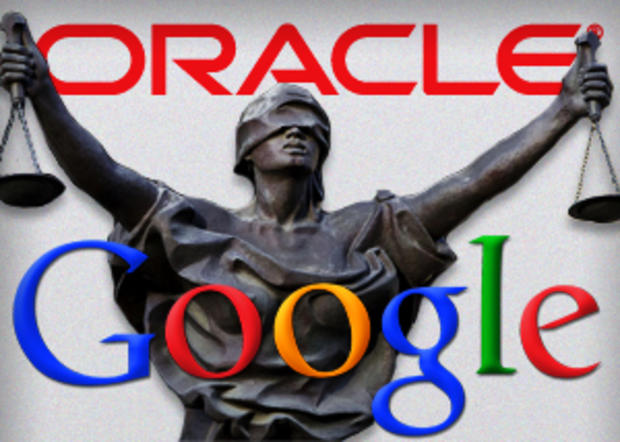Oracle v. Google jury returns partial verdict, favoring Oracle
(CNET) SAN FRANCISCO - The jury in the Oracle v. Google trial rendered a partial verdict, favoring Oracle, in the copyright phase of the trial. Yet a question the jury failed to decide prompted Google to call for a mistrial, and could sharply limit damages even if the verdict stands.
Full coverage of Oracle vs. Google at CNET
Android, Java, and the tech behind Oracle v. Google (FAQ)
The five male and seven female jurors failed to deliver unanimous answers to four detailed questions (see below) Judge William Alsup provided them prior to deliberations. The questions aimed to determine whether Google's Android mobile platform infringed on part of the Java programming language that Oracle acquired from Sun in 2010.
The entire jury did agree on the first, and most important, question -- that's 1A, for those of you following with the scorecard -- finding that Google did infringe the overall structure, sequence and organization of Oracle's Java language (which the judge had told instructed the jury to assume was copyrighted, although that question remains unsettled).
However, the jurors were at an impasse on the second part of Question 1, which asked if Google proved that it had made "fair use" of that material or not. As to the documentation for the 37 Java API packages in question taken as a group, the jury found that Oracle did not prove that Google infringed. The jury similarly found that Google did not infringe on English-language comments in CodeSourceTest.java and CollectionCertStoreParameters Test.java or source code in seven "Impl.java" files. However, it agreed that Google did infringe on the rangeCheck method in TimSort.java and ComparableTimSort.Java.
Following the verdict, Google's attorneys called for a mistrial, arguing that there can't be a partial answer on Question 1. Google will argue for a mistrial on Tuesday and Thursday; Judge Alsup said the mistrial question should be settled by Thursday.
While Judge Alsup allowed in his instructions to the jury that Oracle's copyrights can extend to the structure, sequence and organization of the Java APIs, he could ultimately decide as a matter of law whether APIs are protected by copyright.
Google issued the following statement to CNET:
We appreciate the jury's efforts, and know that fair use and infringement are two sides of the same coin. The core issue is whether the APIs here are copyrightable, and that's for the court to decide. We expect to prevail on this issue and Oracle's other claims.
Google also claims that pending further rulings by Judge Alsup, there is "zero finding of copyright liability" outside of nine lines of code. Google similarly claims that Oracle attributed "no value" to those nine lines in its damages report.
Oracle, too, had a statement:
Oracle, the nine million Java developers, and the entire Java community thank the jury for their verdict in this phase of the case. The overwhelming evidence demonstrated that Google knew it needed a license and that its unauthorized fork of Java in Android shattered Java's central write once run anywhere principle. Every major commercial enterprise -- except Google -- has a license for Java and maintains compatibility to run across all computing platforms.
At issue in this phase of the trial was whether Google infringed 37 Java APIs (application programming interfaces). Oracle argued that Google copied the APIs from the Java core libraries into the Android core libraries. Oracle's lawyers compared the creation of APIs to writing a piece of music, going further to say that API's are not just "ideas," but creative, copyrightable works that require significant expertise and time to develop.
Google argued that there was no copyright infringement because Google didn't copy any unauthorized Java code and made fair use of the Java language APIs in Android. Google argued that its use of the Java APIs was "transformative," rather than derivative, because it created something new with Java. In addition, Google's legal team played up that Sun publicly approved of Android's use of Java.
The verdict came after more than a week of deliberations, which began a week ago today after lawyers from both Oracle and Google offered closing statements for the first phase of this trial.
On Tuesday, both legal teams met in the courtroom for a one-hour conference at 10 a.m., debating answers to jury questions concerning Google's use of Java APIs from Apache Harmony as well as Oracle's proposed witness list for the next segment of the trial, which will focus on patent infringement.
On Wednesday, the jury returned with more questions that pointed toward copyright infringement. Although the answer didn't entirely please Google's lawyers, Alsup instructed the jury that they could consider both direct and indirect streams of revenue related to Android.
